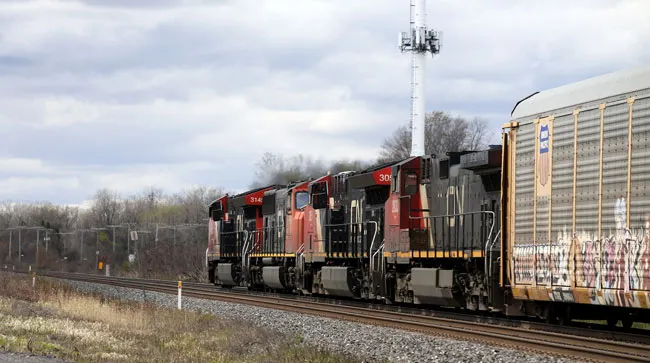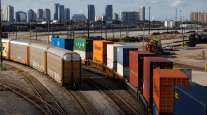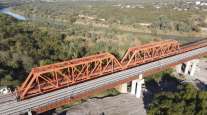Bloomberg News
Canadian Economy at Risk as Rail, Port Strikes Approach

[Stay on top of transportation news: Get TTNews in your inbox.]
Canadian businesses are warning about potential long-term damage to the economy if railway and port strikes go ahead and choke the country’s vital trading arteries, following walkouts last year.
Canada’s two main railroad companies — Canadian National Railway Co. and Canadian Pacific Kansas City — are preparing to halt the movement of goods Aug. 22 if they can’t agree on a deal with the Teamsters union, which represents more than 9,000 workers. That would paralyze the flow of important commodities like fertilizer and jam and divert container traffic.
The railways have said they will lock workers out at 12:01 a.m. Eastern time on Aug. 22 if they have to. Labor Minister Steven MacKinnon and federal mediators met with the parties in Montreal on Aug. 20 and will meet again in Calgary on Aug. 21. MacKinnon is urging the two sides to find a resolution and “fulfill their responsibility to Canadians,” according to a spokesperson.
At the same time, a union of 730 dock foremen in British Columbia — home to Canada’s busiest port in Vancouver — also is threatening to strike, pending a vote by the International Longshore & Warehouse Union Local 514.
RELATED: Canadian Labor Board Leaves Door Open for Rail Strike
Businesses say they’re still reeling from a 13-day dockworker strike by the ILWU a year ago, which the Greater Vancouver Board of Trade said disrupted $8 billion in trade. Canada’s transport ministry said the disruption reduced Canada’s gross domestic product.
“Our reputation as a reliable trading partner, already fragile after the strikes in our Western ports last summer, appears poised to take another costly hit,” Bridgitte Anderson, president of the Greater Vancouver Board of Trade, said in an emailed statement Aug. 19.
Industry bodies representing automakers and miners had also previously warned about the impact of strikes to customer relationships and Canada’s brand for trade stability, according to an April report by the House of Commons trade committee.
U.S. marine terminals swooped in and signed long-term contracts with shipping companies to reroute cargo away from Canada’s west coast. “The impacts of that continued cargo diversion are still present today,” the British Columbia Maritime Employers Association said in a briefing for lawmakers in December 2023.
As fresh strikes loom, cargo is again being delayed and disrupted, said Jonathan White, commercial vice president at Canada Steamship Lines, which ships millions of tons per year of dry bulk commodities, including iron ore, grain, cement and salt.

A Canadian National Railway locomotive pulls a train in Montreal. (Christinne Muschi/Bloomberg News)
Erosion of Confidence
Some so-called discretionary cargo may be heading south to the Port of Long Beach and the Port of Los Angeles, which are handling a surge of containers approaching records set during the pandemic.
“We’re starting to see, especially on the West Coast at least, some loss of market share here,” said Bonnie Gee, president of the Chamber of Shipping of British Columbia. “It erodes confidence, for sure, in the Canadian market.”
Potash supplier Canpotex is fretting about where Asian importers will turn if Canadian products are blocked, citing market share lost to Russia after last year’s strike.
RELATED: CN Rail Strike Begins, Threatening Canada Oil, Grain Shipments
“We are stepping up to ship more Canadian potash in light of sanctions and restrictions on Russia and Belarus, but that hinges on Canada’s railroads and ports functioning,” said Natashia Stinka, Canpotex’s director of public affairs. One week of Canpotex’s train traffic is equivalent to about 10,000 trucks on the road, according to the company.
Even without a strike by British Columbia’s dock foremen, train strikes would effectively shut down a lot of port traffic, as about two-thirds of cargo at the Vancouver Fraser Port Authority is moved by rail, according to Alex Munro, a port spokesperson.
Ships currently en route to Vancouver are being told to slow down and delay their arrivals to prevent further congestion, and the port expects goods, including grain, potash, coal and other cargo, to be disrupted, he said.
Want more news? Listen to today's daily briefing below or go here for more info:




